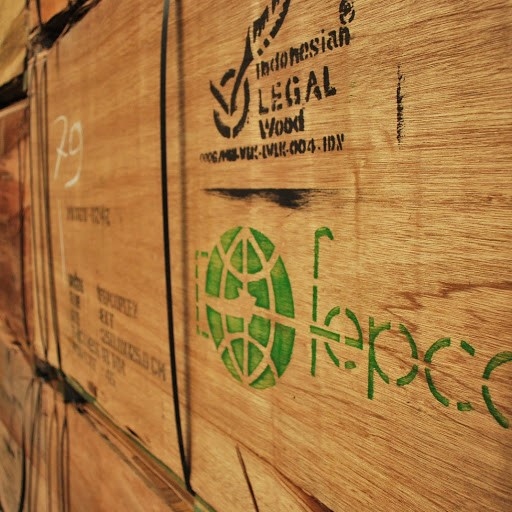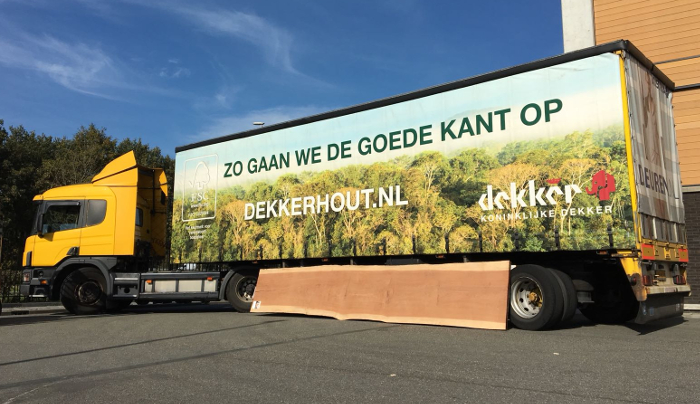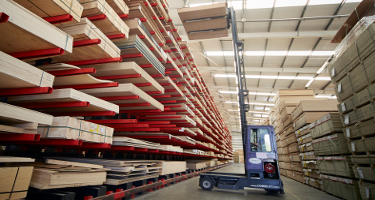Three leading European importing companies comment on their experience of purchasing FLEGT licensed products from Indonesia in the last two years.
 In timber trade press interviews in late 2016 the three importers, Fepco of Belgium, Dekker Hout of the Netherlands and James Latham of the UK enthusiastically welcomed the start of FLEGT licensing by Indonesia. They saw it as a major achievement by the country given its difficult past history in timber legality assurance. It was also viewed as a breakthrough in terms of the international market reputation of tropical timber, a spur to other FLEGT VPA-engaged countries to accelerate their progress through the initiative and an administrative and logistical advance, as imports of licensed products from Indonesia would be exempt further due diligence under the EUTR.
In timber trade press interviews in late 2016 the three importers, Fepco of Belgium, Dekker Hout of the Netherlands and James Latham of the UK enthusiastically welcomed the start of FLEGT licensing by Indonesia. They saw it as a major achievement by the country given its difficult past history in timber legality assurance. It was also viewed as a breakthrough in terms of the international market reputation of tropical timber, a spur to other FLEGT VPA-engaged countries to accelerate their progress through the initiative and an administrative and logistical advance, as imports of licensed products from Indonesia would be exempt further due diligence under the EUTR.
Two years on, in the following question and answer interview, all three companies say they’ve seen their own businesses advance and develop, although they point out that the market has become ever more diverse and competitive for tropical timber. Rival products, such as temperate hardwoods, wood plastic composites (WPCs) and modified and engineered softwoods, have all gained ground over the period.
The businesses also remain very supportive of Indonesia’s FLEGT achievement, a ‘breakthrough in timber legality and market credibility’, as one company described it. At the same time they see scope for development and enhancement of the wider FLEGT VPA initiative. There is also a stress that FLEGT is not a stand-alone solution for proving and promoting the industry’s environmental credentials, but a valuable tool in a broader armoury, operating alongside others in assuring timber legality and sustainability. Nor, they say, is it a badge that can expect to command a premium, or trump usual timber purchasing considerations of price, quality and availability.
Question: How has your business developed in the last two years?
Robber Dekker, CEO Dekker Hout (RD): It’s been quite a good period, however a large part of the market in hardwood has been replaced by our WPCs and softwoods.
Peter Pieper, Director FEPCO (PP): We’ve developed very well, although tropical plywood (and we only deal in plywood) has continued to become a niche – a trend of many years.
Ewa Bazydlo, Environmental Manager James Latham (EB): We’re always striving for growth and exploring market opportunities and sustainable tropical timber is on our agenda; supporting product development and positive promotion.
 Question: How have your imports of Indonesian timber and wood products developed?
Question: How have your imports of Indonesian timber and wood products developed?
EB: Our portfolio includes a variety of plywood and sawn timber and we’ve enjoyed steady, solid trade.
PP: Our Indonesian business has not really increased, but that’s mostly due to supply problems, particularly log shortages, mainly weather-related.
RD: Our total Indonesian imports are down, although imports of pine and MDF interior doors have increased considerably. The main reason for the decrease in hardwood products is price. Competition from Asian buyers (such as Indian and Chinese) and the US market shift in plywood imports from China towards Indonesia (due to US import taxes) has driven up prices to levels unacceptable for Europe, both for Meranti and Bangkirai.
Question: Has the availability of FLEGT-licensed products impacted your Indonesian business?
RD: It’s had a positive effect due to the certainty of legality. It’s benefited Indonesia relative to imports from Brazil and even Africa. At the same time Malaysia has had good availability of PEFC-certified Meranti, which favours its suppliers.
EB: FLEGT is not a demand driver for us – first and foremost we promote timber. But it has made trade easier as there’s no need to run due diligence.
PP: Our Indonesian business hasn’t significantly increased, but neither has it decreased and we’ve had more supply difficulties than selling problems. However, having said that, Indonesian plywood has to be competitive and at the moment it is losing ground due to unfavourable exchange between the USD vs Euro. Russian Birch, for example, is currently more competitive.
Question: Do you communicate to customers that you supply FLEGT-licensed products?
EB: We support the FLEGT process and communicate the message in many ways; in product code descriptions, in verbal communications with customers, highlighting the benefits of Indonesian timber, including its clear legality path, and in our in-house magazine Natural Choice. We also revised our environmental brochure to include Indonesia’s achievement.
RD: We don’t communicate it specifically, but clients now know that Indonesia is a certainty in terms of legality.
PP: Of course, although our clients are mainly professional importers who are fully aware about FLEGT.
Question: Is there much interest in FLEGT licensing in the marketplace?
PP: FLEGT is appreciated, but it’s not the reason clients buy a particular product. It may have an effect on purchasing decisions, but they’re essentially based on application and price.
RD: There’s not much interest, as customers expect us as an importer to deal with those issues.
EB: Customer awareness is weak, but slowly improving on certification schemes generally. Currently they never ask for FLEGT timber, but only 10% actively specify FSC or PEFC.
 Question: Do you give any preference to supplying FLEGT-licensed products over comparable alternatives?
Question: Do you give any preference to supplying FLEGT-licensed products over comparable alternatives?
RD: Yes, but only compared to non-certified wood. We give preference to FSC first and PEFC second.
PP: If products are similar, we will always give preference to FLEGT-licensed. But we’re market driven. Some markets will require both certified and FLEGT plywood, others “only” FLEGT-licensed.
EB: As I said, the first consideration is the product, next we give priority to FSC/PEFC, then FLEGT, then verified legal. But perhaps more promotional work needs to be done on the subject of FLEGT relative to sustainability. There’s still market perception that FLEGT doesn’t cover all aspects, as FSC/PEFC certification does, and there are a range of question marks related to this. For instance, should FLEGT be accepted as a green pass for FSC Controlled Wood and should green building schemes, such as LEED and BREEAM, award points for FLEGT timber as they do for FSC and PEFC?
Question: Would you like to see more market communication on the FLEGT VPA initiative and FLEGT licensing, notably on the wider social, environmental and economic benefits?
EB: Yes, the wider benefits and FLEGT’s sustainability criteria need to be expressed more often. It would help raise end-user awareness, resulting in more informed procurement choices where like-for-like product is offered.
PP: Professionals here are well aware of FLEGT and its benefits in terms of due diligence obligations. However information on the positive impacts from the supply country point of view are certainly missing.
RD: Any wider explanation of the FLEGT initiative would be helpful.
Question: Would you like to see other countries ‘fast-tracked’ through the FLEGT VPA process, while ensuring this does not lower standards?
RD: Yes we would. Notably Cameroon and Bolivia.
PP: Every additional country participating in the FLEGT programme will improve the image of the tropical timber trade and support efforts to preserve the rainforests. However it has to be done carefully so as not to compromise its credibility. Countries like Malaysia, Viet Nam and Ghana are top of the list and probably at the most advanced stage of their VPAs.
EB: It’s what I believe every timber trading organisation would wish for and is looking forward to. A credible fast-tracked FLEGT process would still be more objective and consistent than a company’s risk-based assessment to the requirements of the EU Timber Regulation.
Question: How else would you like to see the FLEGT initiative and FLEGT licensing develop?
EB: We’d like to see the FLEGT initiative taken up by a specialist in this area in the EU in order to come up with new, creative and constructive ideas for developing it further.
RD: FLEGT is a good first stage, but the goal should be sustainable production, not just legal. FLEGT should not be used as a poor alternative for FSC certified.
PP: I’d like to reiterate our earlier comments, that we must now work on FLEGT- licensed products becoming an acceptable alternative in projects where sustainable products are requested, but not always available. Highlighting the issue, we recently heard about an actual EU construction project in Luxemburg for which the specifier would only accept FSC or PEFC products, not FLEGT. It does not make sense that the EU is investing so much in the FLEGT initiative, while FLEGT licensed products (in this case plywood) are not accepted for its own building projects. In this particular case, we believe, Russian Birch Plywood was the beneficiary. The situation with regard government procurement generally must change.
